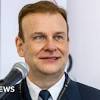Domestic unrest interrupts Macron's European future speech

THE HAGUE, Netherlands -- French President Emmanuel Macron laid out his vision of a bold, assertive European future on Tuesday, but not before simmering anger at his domestic pension reforms boiled over once more as he began his speech in the Netherlands.
Some members of the audience at a theater in The Hague shouted at Macron, accusing him of undemocratically forcing through his plan to raise the retirement age from 62 to 64.
Macron's pension reforms have prompted massive protests and strikes in France. Critics were additionally infuriated when he used a special constitutional power last month to push the bill through parliament without a vote.
Some protesters in The Hague theater Tuesday brandished a banner calling Macron the “president of violence and hypocrisy.”
“I can answer these questions if you give me some time," Macron responded, speaking in English. The protesters were quickly removed from the hall.
It’s “very important to have this type of discussion,” an unflustered Macron said. “The day you consider that ‘when I disagree ... I’m the one to decide’ ... you put democracy at risk,” he added, citing the examples of rioters storming the U.S. Capitol in 2021 and Brazil’s top government buildings earlier this year.
Earlier in the day, before Macron laid a wreath at the national monument in Amsterdam, a small group of people protesting Macron’s pension reforms briefly held up a banner in French that said: “We will not be beaten into retirement.” More protesters also demonstrated peacefully outside the theater in The Hague where he made his speech.
In his scripted speech, Macron outlined his vision for the future of European sovereignty, saying it should be based on the five pillars of competitiveness, industrial policy, protectionism, reciprocity and cooperation.
Russia’s war in Ukraine “opened probably one of the most perilous times of our European union. Our union is said to grow stronger through crisis but never had we faced such a threat," Macron said.
Both the COVID-19 pandemic and the war "were big accelerators of this European sovereignty,” he added.
“We can set up a new economic doctrine which will allow us to reconcile creating jobs, financing our social model, dealing with climate change and being more sovereign and deciding for ourselves,” he said. “This is critical in this period when we have war and our economy is being weaponized.”
The speech in The Hague came after Macron raised eyebrows with his comments on Taiwan after his recent visit to China.
“The question we need to answer, as Europeans, is the following: Is it in our interest to accelerate (a crisis) on Taiwan? No,” Macron was quoted as saying in an interview published Sunday in French newspaper Les Echos and by Politico Europe.
“The worst thing would be to think that we Europeans must become followers on this topic and take our cue from the U.S. agenda and a Chinese overreaction.”
The remarks raised questions about whether Macron’s views are in line with the European Union’s position and whether the bloc of 27 is able to become the “third superpower” that Macron says he hopes to build within “a few years.”
The interview was given on Friday, before China launched large-scale combat exercises around Taiwan that simulated sealing off the island in response to the Taiwanese president’s trip to the U.S. last week.
China and Taiwan split in 1949 after a civil war. The government in Beijing says the island is obliged to rejoin the mainland, by force if necessary.
Macron emphasized the concept of “strategic autonomy” for Europe which he has promoted for years. He warned of what he called the “trap” that would lead to the bloc “getting caught up in crises that are not ours.” His speech in The Hague also called for Europe to become ever more self-sufficient to avoid becoming reliant on other powerful trading partners.
Macron’s two-day trip to Amsterdam and The Hague is the first state visit by a French leader since Jacques Chirac 23 years ago and underscores the close links between the Netherlands and France and the two leaders.
After arriving in Amsterdam, Macron — with Dutch King Willem-Alexander — inspected a guard of honor on the square outside the capital's royal palace as a military band played and the French and Dutch flags fluttered in a brisk breeze.
In the evening, Macron and his wife, Brigitte, returned to Amsterdam for a banquet hosted by Willem-Alexander.
On Wednesday, Macron's itinerary includes visiting a science park in Amsterdam, talks with Prime Minister Mark Rutte and viewing a blockbuster exhibition of paintings by Dutch Master Johannes Vermeer at the Rijksmuseum.
___
Corbet reported from Paris. Peter Dejong contributed from Amsterdam.


 United States
United States Argentina
Argentina  Australia
Australia  Austria
Austria  Brazil
Brazil  Canada
Canada  Chile
Chile  Czechia
Czechia  France
France  Germany
Germany  Greece
Greece  Italy
Italy  Mexico
Mexico  New Zealand
New Zealand  Nigeria
Nigeria  Norway
Norway  Poland
Poland  Portugal
Portugal  Sweden
Sweden  Switzerland
Switzerland  United Kingdom
United Kingdom 

























